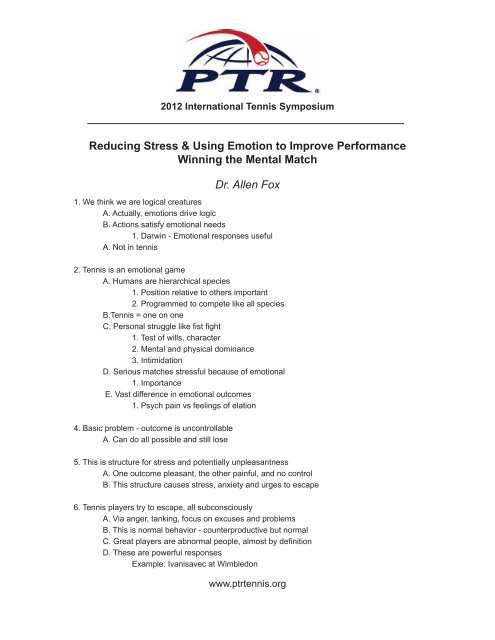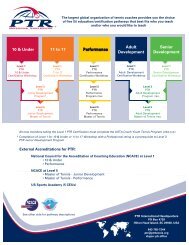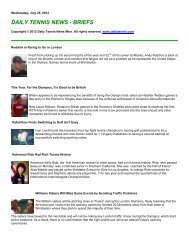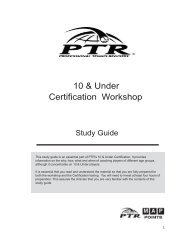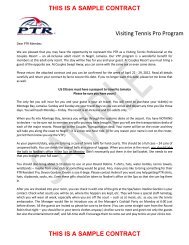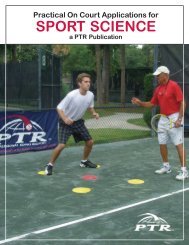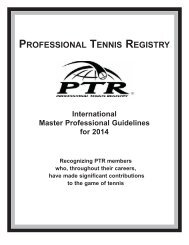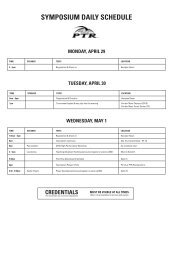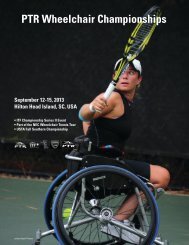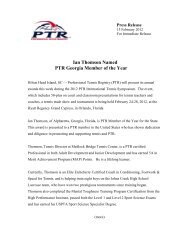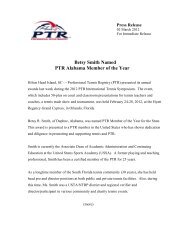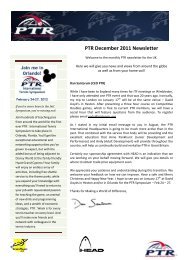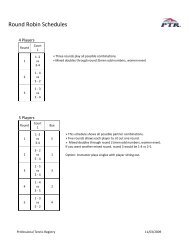Reducing Stress & Using Emotion to Improve Performance Winning ...
Reducing Stress & Using Emotion to Improve Performance Winning ...
Reducing Stress & Using Emotion to Improve Performance Winning ...
Create successful ePaper yourself
Turn your PDF publications into a flip-book with our unique Google optimized e-Paper software.
2012 International Tennis Symposium<br />
<strong>Reducing</strong> <strong>Stress</strong> & <strong>Using</strong> <strong>Emotion</strong> <strong>to</strong> <strong>Improve</strong> <strong>Performance</strong><br />
<strong>Winning</strong> the Mental Match<br />
Dr. Allen Fox<br />
1. We think we are logical creatures<br />
A. Actually, emotions drive logic<br />
B. Actions satisfy emotional needs<br />
1. Darwin - <strong>Emotion</strong>al responses useful<br />
A. Not in tennis<br />
2. Tennis is an emotional game<br />
A. Humans are hierarchical species<br />
1. Position relative <strong>to</strong> others important<br />
2. Programmed <strong>to</strong> compete like all species<br />
B.Tennis = one on one<br />
C. Personal struggle like fist fight<br />
1. Test of wills, character<br />
2. Mental and physical dominance<br />
3. Intimidation<br />
D. Serious matches stressful because of emotional<br />
1. Importance<br />
E. Vast difference in emotional outcomes<br />
1. Psych pain vs feelings of elation<br />
4. Basic problem - outcome is uncontrollable<br />
A. Can do all possible and still lose<br />
5. This is structure for stress and potentially unpleasantness<br />
A. One outcome pleasant, the other painful, and no control<br />
B. This structure causes stress, anxiety and urges <strong>to</strong> escape<br />
6. Tennis players try <strong>to</strong> escape, all subconsciously<br />
A. Via anger, tanking, focus on excuses and problems<br />
B. This is normal behavior - counterproductive but normal<br />
C. Great players are abnormal people, almost by definition<br />
D. These are powerful responses<br />
Example: Ivanisavec at Wimbledon<br />
www.ptrtennis.org
7. This is the reason coaches find it’s so hard <strong>to</strong> change players<br />
A. Players understand but they do it again anyway<br />
B. Not a matter of information<br />
C. Problem is logic (coach’s words) vs. emotion (on court reactions)<br />
D. These don’t mix quickly<br />
E. Anger is easiest <strong>to</strong> change by negative reinforcement<br />
F. Tanking is next and choking is most difficult<br />
G. Player’s deep commitment <strong>to</strong> changes - can fix anger and tanking<br />
H. Frequent relapses because escape emotions always there<br />
1. Recur with tiredness, frustration, lack of confidence<br />
Example: PEP Team travel<br />
2. Like alcoholic on wagon, the problem is always there<br />
3. Cure - can’t say, “Alcohol is bad for you”FOR YOU”<br />
I. The player needs <strong>to</strong> ultimately ‘get it’ at deep level<br />
1. This means commitment is a matter of motivation<br />
Example/Proof: Gun analogy<br />
2. Light bulb must go off for real cure<br />
Example: My experience<br />
J. It’s a form of maturity<br />
1. Took Agassi until his late 20s<br />
8. Generally, your game follows your emotions<br />
A. When competing emotions set the stage<br />
1. The habits are finely tuned and can be disrupted with emotion<br />
B. Make emotions do what you want<br />
C. Choking never cured <strong>to</strong>tally<br />
1. No focus on winning - replace with focus on ritual<br />
2. Relaxation techniques<br />
a. breathing<br />
b. smile<br />
c. adrenaline<br />
3. Practice playing under pressure<br />
2012 International Tennis Symposium<br />
www.ptrtennis.org


